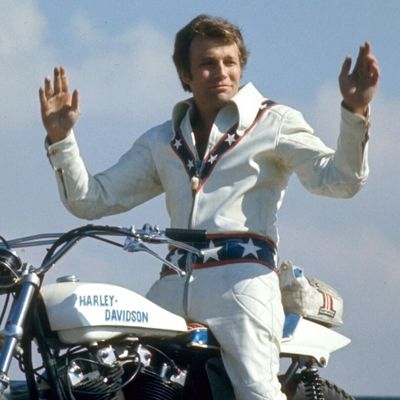
The new documentary Being Evel proves that you can valorize your subject even as you concede that he might have been kind of a shit. Produced and introduced by Jackass’s Johnny Knoxville, this mostly admiring look at the life of Robert C. “Evel” Knievel, whose televised daredevil acts were a mainstay of many a ‘70s childhood, makes the case that Evel’s spectacular feats not only brought together a fractured, cynical nation, but that they also eventually gave rise to the action-sports and extreme-stunts craze of the 1990s and 2000s — which arguably hit its zenith with Jackass itself. But the film also manages to convey some of the complexity of Knievel’s life. “I didn’t think of him as a daredevil. I thought of him as a superhero,” Knoxville recalls. “Now I’m a grown-ass man, and some of the story is hard to reconcile.”
That makes it sound like Evel Knievel had some kind of shocking secret, but no. The paradox Knoxville struggles to reconcile is more blandly crummy than sensational or mysterious: Knievel slept around voraciously, openly cheating on his wife, and he could be a bit of a dickhead to the people who worked for him and others. (The film was produced with the blessing of Knievel’s family, and many of his family members are interviewed here.) At the same time, there was a can-do, all-American optimism and relentlessness to the man that captured the imagination of an entire country, especially during the dark days of Vietnam and Watergate. Here was a guy who took the counterculture figure of the biker — think of the fearless, black-clad Hell’s Angels, with whom Knievel sometimes tussled — and transformed him into a shiny, white-clad figure of boisterous optimism and family-friendly spectacle. Albeit with a dash of bloodlust.
Daniel Junge’s entertaining film makes the point that Knievel’s childhood in the mining town of Butte, Montana, had something to do with his doggedness. (“You just don’t back down” is how an interviewee identifies the “Butte Credo,” but that’s probably not so dissimilar from the unofficial credo of any other town in America.) The ambitious Knievel busted around several different jobs — including selling insurance, where he once visited a mental hospital and sold 271 policies in a single day — before he lucked on the whole daredevil thing. Indeed, his first stunt came about as a sales ploy, back when he was selling Honda motorcycles: He decided to jump his cycle over “some scared cougars and pissed-off rattlesnakes,” the latter of which reportedly went flying into the crowd.
That combination of showman, con man, and man of action served him well the rest of his career. We learn about how a then-unknown Knievel built an audience for his infamous 1967 jump over the fountains at Caesar’s Palace by calling into the management of the casino pretending to be different sportswriters asking about the event, always taking care to mispronounce his name in a new way. That event ended with a spectacular failed landing, which sent Knievel spinning but also turned him into a celebrity. “It’s the bad landings that bring people out,” he once said. Failure, in other words, was somehow both his nemesis and his greatest ally. Evel’s son Robbie, serving as his opening act, often didn’t succeed at his stunts — which just served to heighten the suspense around the main event. In preparing for his infamous attempt to rocket across the Snake River Canyon, Evel and his team purposefully made sure an unmanned test run would nose-dive.
He was also more and more full of himself as his star rose: There’s a plainspoken, aw-shucks quality to Knievel’s early appearances that seem to fade away after the 1971 release of Evel Knievel, a not-well-received biopic about him starring George Hamilton and written by the notorious John Milius, who would go on to write Apocalypse Now and direct films like The Wind and the Lion and Conan the Barbarian. Knievel didn’t like the film at all; he’d later star in his own fictionalized movie, called Viva Knievel! But Hamilton, interviewed here, makes the point that the daredevil’s whole demeanor changed after he got a dose of Milius’s infectious macho poetry. He began to spout off about living in a twilight world and attempting the impossible and about how a man like him has to do more than just exist — basically turning into a cartoon version of Teddy Roosevelt.
Still, such blowhardiness wasn’t entirely inappropriate. Knievel might have been a con artist at heart, but his act wasn’t bullshit: He really was facing down death. “Nobody wants to see me die,” Knievel once said, “but they don’t want to miss it if I do.” How often do magicians fail? Acrobats? Tightrope walkers? “He’s probably the only man in history who has become famous for trying to kill himself,” says Johnny Carson as he introduces Knievel in a clip from The Tonight Show. As the film makes clear, Evel often bore out that tension in his acts, and it slowly, subtly ate away at him. There was a real darkness there — behind the American flags and the fringed jackets and the fireworks — and Being Evel, to its credit, isn’t afraid to face it.


